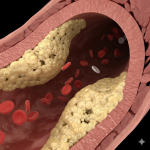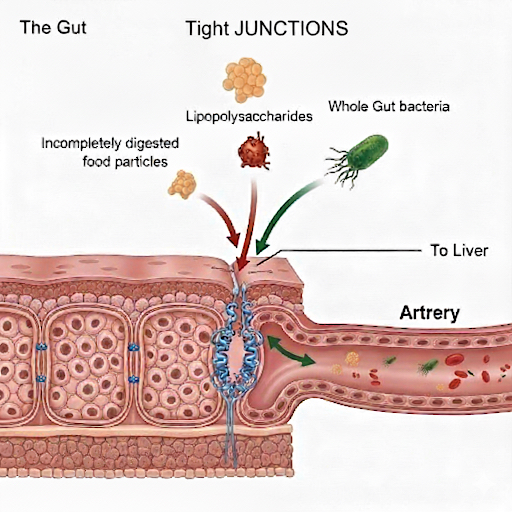Atherosclerosis
To see the page referred to in this video click here. This study published on 17th July 2024 concludes that “The results of the meta-analysis verified that the intestinal barrier was damaged and intestinal permeability was increased in patients with cardiovascular diseases.“
 The plaque buildup in the arteries is in a large part, an unintended consequence of the immune system trying to deal with substances, including partially digested food, bacteria and bacterial fragments called lipopolysaccharides, that have leaked from a compromised gut. This chronic immune activation leads to persistent inflammation within the artery walls, ultimately contributing to the formation and progression of atherosclerotic plaques. The presence of pesticide and herbicide residues can further worsen this situation by damaging the gut lining, disrupting the gut microbiome and directly promoting inflammation in the arteries. This highlights the critical importance of gut health in maintaining cardiovascular well-being.
The plaque buildup in the arteries is in a large part, an unintended consequence of the immune system trying to deal with substances, including partially digested food, bacteria and bacterial fragments called lipopolysaccharides, that have leaked from a compromised gut. This chronic immune activation leads to persistent inflammation within the artery walls, ultimately contributing to the formation and progression of atherosclerotic plaques. The presence of pesticide and herbicide residues can further worsen this situation by damaging the gut lining, disrupting the gut microbiome and directly promoting inflammation in the arteries. This highlights the critical importance of gut health in maintaining cardiovascular well-being.
 The medical meta-data, from pubmed.ncbi.nlm.nih.gov, strongly suggests that increased intestinal permeability allows the leakage of various harmful substances from the gut into the bloodstream. This triggers a cascade of events involving chronic inflammation and immune activation, contributing to the formation of atherosclerotic plaques and the development of high blood pressure.
The medical meta-data, from pubmed.ncbi.nlm.nih.gov, strongly suggests that increased intestinal permeability allows the leakage of various harmful substances from the gut into the bloodstream. This triggers a cascade of events involving chronic inflammation and immune activation, contributing to the formation of atherosclerotic plaques and the development of high blood pressure.
The gut-heart axis is a complex interplay where the integrity and balance of the gut environment significantly influence cardiovascular health.
The inflammation caused by a leaky gut can directly contribute to:
Endothelial Dysfunction: The inner lining of the blood vessels (endothelium) becomes damaged and inflamed. This is a critical first step in the development of arterial stiffness and atherosclerosis.
Plaque Formation: The immune system’s inflammatory cells (like macrophages) are drawn to the damaged arterial walls, where they engulf cholesterol and form fatty streaks, the beginning of atherosclerotic plaque.
Arterial Stiffening: Chronic inflammation leads to changes in the structure of the arterial wall, including a loss of elasticity and an increase in collagen, which makes the arteries stiff and less able to expand and contract.
Research Showing This is a Widespread Phenomenon:
While the exact percentage of the population affected is still being studied, research is increasingly showing this link is not limited to rare cases but is a contributing factor in many people with cardiovascular disease.
Human Studies:
Correlation between Gut Microbiota and Arterial Stiffness: Systematic reviews of human and animal studies have found a direct correlation between the abundance of certain bacteria associated with altered gut permeability and inflammation, and increased arterial stiffness. This suggests that the composition of your gut microbes directly impacts vascular health.